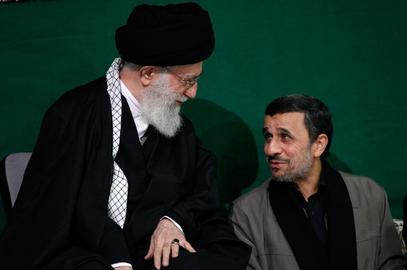Iran’s supreme leader Ayatollah Khamenei has “explicitly forbidden” former President Mahmoud Ahmadinejad from putting himself forward as a candidate in Iran’s 2017 presidential election.
Despite not having any constitutional remit to intervene in elections, Khamenei’s announcement has injected new emotion and drama into Iran’s already divided political arena.
Although media reports around the globe had speculated about Khamenei’s displeasure over the last 10 days, the supreme leader only publicly announced his objections on Monday, September 26 — though he stopped short of mentioning Ahmadinejad directly. The announcement surprised many in Iran, who assumed the leader would not choose to be so open about his views.
On September 19 Fars News Agency quoted Mehdi Fazaeli, a high-level official of the Revolutionary Guards, who passed on the news that Khamenei had “explicitly forbidden” Ahmadinejad from pursuing the candidacy. There were other signs, too, that other key figures in Iran’s establishment were almost uniformly united against Ahmadinejad’s candidacy.
Abbas Amirifar Rouhani, a former government official close to Ahmadinejad himself, wrote that “according to unofficial reports, 10 members of the Guardian Council” out of 12 wanted to disqualify Ahmadinejad. There were further reports that Khamenei instructed Ahmadinejad to stop his thinly-disguised campaign trips to Iran’s provinces — which, in any case, are not allowed under Iranian law until spring 2017, when the election campaign season officially begins.
In mid-September, Ahmadinejad set out on a trip to the province of Gorgan, and he had planned other visits to the provinces, where he has traditionally had some of his strongest support. His supporters challenged critics to prove that the supreme leader objected to these excursions, and some asked for the leader’s office to confirm reports.
Days later, Khamenei went public. Without naming names, he was as clear as he could be.
“It is true that someone – a gentleman – had come to see me,” Khamenei said in his speech. “I said to him that he should not participate in [the election] because of his own interests and in the interests of the country." Then he seemed to find it necessary to qualify exactly wha he had said. "I did not tell him he should not participate," he told the crowd. "Rather, I told him I do not think it would be a wise course of action. Well, this is a normal thing. We should say to our pious brothers what we see, what we understand and what we deem to be good for them. After all, we are more familiar with the conditions of the country than most brothers.”
Khamenei went on to say that, bearing in mind the general mood in Iran at the moment, he believed the “gentleman’s participation” in the forthcoming election would polarize the country. “Polarization is harmful,” he said.
Not His Kind of Revolution
Last year, Khamenei reminded the public of his role in Iranian life, proudly identifying himself as “not a diplomat but a revolutionary.” But the recent announcement suggests he also wants to identify which revolutions suit him — and one involving Ahmadinejad is not what he has in mind. His speech made this clear, at least to those with insider knowledge of Iran’s political machinations.
But Khamenei also knows from experience that Ahmadinejad is likely to defy him, ignoring any hints or even a confidential message from the supreme leader. In the summer of 2009, against the wishes of the supreme leader, Ahmadinejad appointed his close associate Esfandiar Rahim Mashaei as hs first vice president. Khamenei sent him a confidential letter urging him to reconsider, but Ahmadinejad ignored it — until Khamenei made the letter public via the deputy speaker of the parliament and Mashaei was forced to resign.
The second time was in 2011 regarding the fate of Intelligence Minister Heydar Moslehi. Ahmadinejad planned to dismiss him, and Khamenei forbade him. When Ahmadinejad ignored him, again, Khamenei wrote a public letter to put him in his place. In protest, Ahmadinejad refused to go to work for 11 days. He returned only after he was informed that parliament was seriously considering taking steps to impeach him for incompetence. It was a defining moment, when a large number of Iran’s influential principalists turned their backs on Ahmadinejad.
Now Khamenei has made his views clear again. He has forced Ahmadinejad to go home and stay there until he says otherwise. If Ahmadinejad dares to defy him again, it could spell the end of his political life.
visit the accountability section
In this section of Iran Wire, you can contact the officials and launch your campaign for various problems

























comments